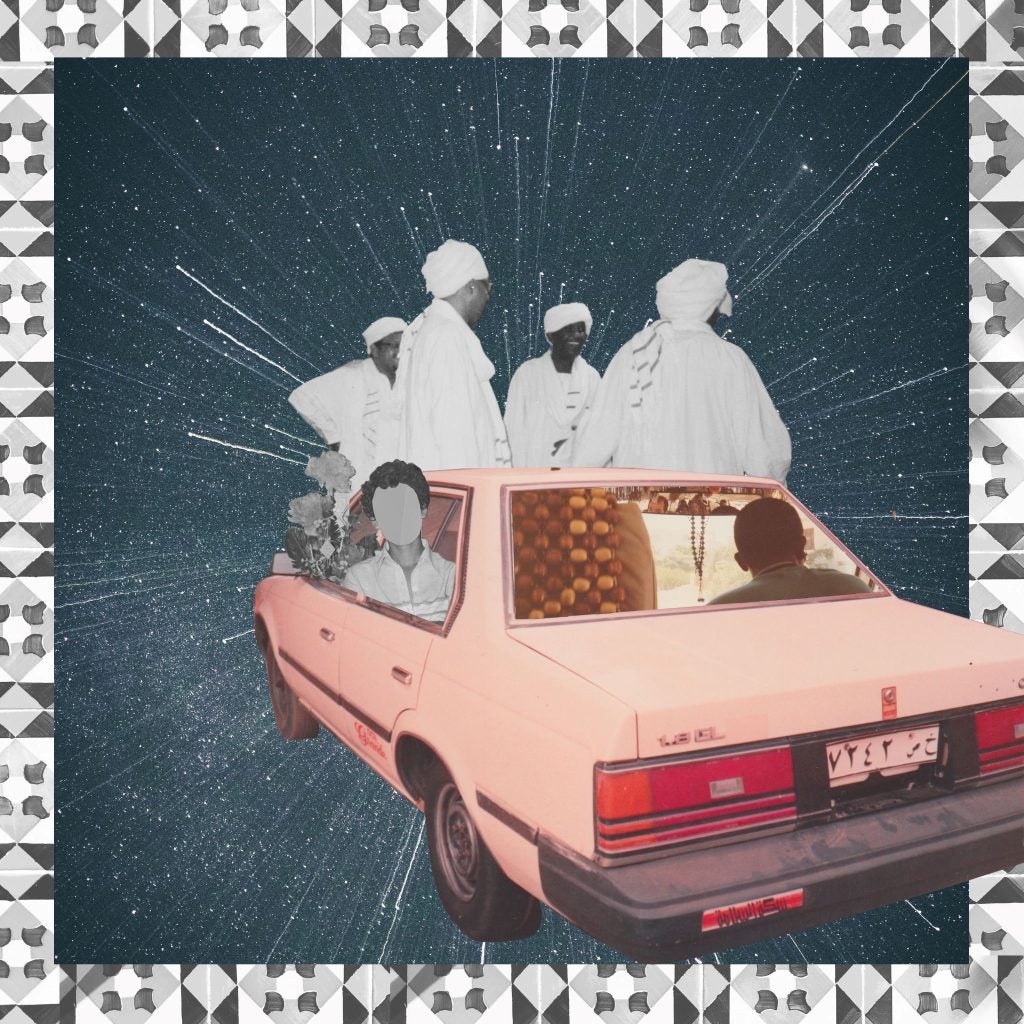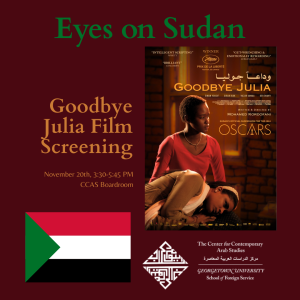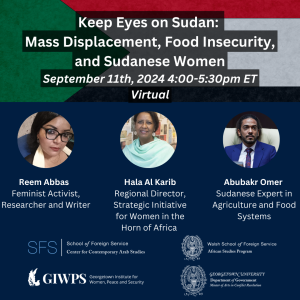
A Year-Long Series on Conflict, Displacement, and Resilience
By Coco Tait
More than two years into one of the world’s most pressing and under-addressed conflicts, Sudan remains at the epicenter of a multifaceted humanitarian and political crisis. With over 12 million people displaced—including 2 million who have fled the country—and more than 18 million in need of humanitarian aid, the war in Sudan has largely escaped sustained global attention or meaningful diplomatic engagement. The devastation has been particularly acute in Darfur, where the threat of genocide looms, and where women and girls face staggering levels of sexual violence in this conflict.
In response to this ongoing emergency, CCAS— in collaboration with Georgetown’s African Studies Program, the Conflict Resolution Program, the Gender+ Justice Initiative, and the Georgetown Institute for Women, Peace and Security—launched a year-long event series that has sought to center Sudanese voices, deepen analysis of the conflict’s local and regional dimensions, and imagine more just fu- tures. Through these public talks and discussions with scholars, practitioners, and activists, the “Keep Eyes on Sudan” series has provided a platform to examine both the structural violence and the enduring strength of the Sudanese people and to elevate Sudanese voices within our community in Washington, D.C. and beyond. Most of the events were recorded and are available to watch on the CCAS YouTube channel.
The series opened in September 2024 with a virtual panel, “Mass Displacement, Food Insecurity, and Sudanese Women,” featuring Reem Abbas, Hala Al Karib, and Abubakr Omer. The event set the tone for the series through its focus on the disproportionate impact of the conflict on women, the food crisis, and the ongoing displacement of Sudanese communities.
 In November, the Georgetown community gathered for a screening of Goodbye Julia, followed by a group discussion. Goodbye Julia was Sudan’s official submission for the 2024 Oscars and provides a power- ful lens into Sudanese society in the lead-up to the current crisis, offering space to reflect on the cultural and historical roots of conflict as well as the emotional costs of political fragmentation.
In November, the Georgetown community gathered for a screening of Goodbye Julia, followed by a group discussion. Goodbye Julia was Sudan’s official submission for the 2024 Oscars and provides a power- ful lens into Sudanese society in the lead-up to the current crisis, offering space to reflect on the cultural and historical roots of conflict as well as the emotional costs of political fragmentation.
The series continued in December with “Higher Education in Times of Conflict,” a panel exploring the toll of war on universities and the academic community in Sudan. Co-sponsored by the MESA Global Academy and the African Studies Association, this event brought together scholars and educators to reflect on both loss and continuity within the educational sector. This event featured remarks from Elobaid A. Elobaid, a Georgetown professor and senior advisor to the United Nations, and Rebecca Glade, an alum of Georgetown University who authored the report “Research in Displacement: The Impact of War on Sudan’s Higher Education and Academic Research Community.”
In January 2025, a roundtable discussion titled “Regional Dynamics of the War in Sudan,” investigated the geopolitical stakes of the conflict, including the role of neighboring states, the failure of international mediation, and the long history of external interference that has shaped Sudan’s trajectory. Analysts Ian Barnes, Nour Khalil, and Zeinab Mohammed Salih joined us for this discussion.
April featured two events. The first, “Teaching and Artistic Production in Sudan,” was held in collaboration with the CCAS Education Outreach program and included a presentation of a new online teaching tool on Sudan created by MAAS students (see page 20 for more). Following the student pre- sentation, Sudanese-American artist Waad Husein discussed and exhibited her work (see above and on the cover), offering insight into how visual culture serves as a medium for documenting, interpreting, and responding to Sudan’s political and social realities.
 Later in the month, “Voices of Resilience: The Struggles and Strengths of Sudanese Women Refugees” highlighted the lived experiences of Sudanese women navigating displacement and exile, underscoring both trauma and resistance in the refugee experience. This event featured Wala Mohammed and Maha Tambal.
Later in the month, “Voices of Resilience: The Struggles and Strengths of Sudanese Women Refugees” highlighted the lived experiences of Sudanese women navigating displacement and exile, underscoring both trauma and resistance in the refugee experience. This event featured Wala Mohammed and Maha Tambal.
We hope that the “Keep Eyes on Sudan” series has served to bring attention to a crisis too often neglect- ed while providing a platform for Sudanese agency and analysis. The events have illuminated not only the devastating toll of the ongoing conflict but also the strategies of resilience, resistance, and care that define Sudanese responses. In addition, CCAS has maintained a webpage highlighting Sudanese-led charities and vetted international efforts as a way to support and lend our platform to endeavors pursuing peace and justice.
By convening scholars, artists, activists, and the broader public, the Georgetown community, in line with the Jesuit values that founded this institution, has affirmed the importance of sustained, jus- tice-oriented engagement with Sudan. The series reminds us that even in protracted crises, there are voices to hear, histories to learn from, and futures to fight for. ◆
Coco Tait is the CCAS Assistant Director of Events and Programs.
This article was published in the Fall 2024-Spring 2025 issue of the CCAS Newsmagazine.